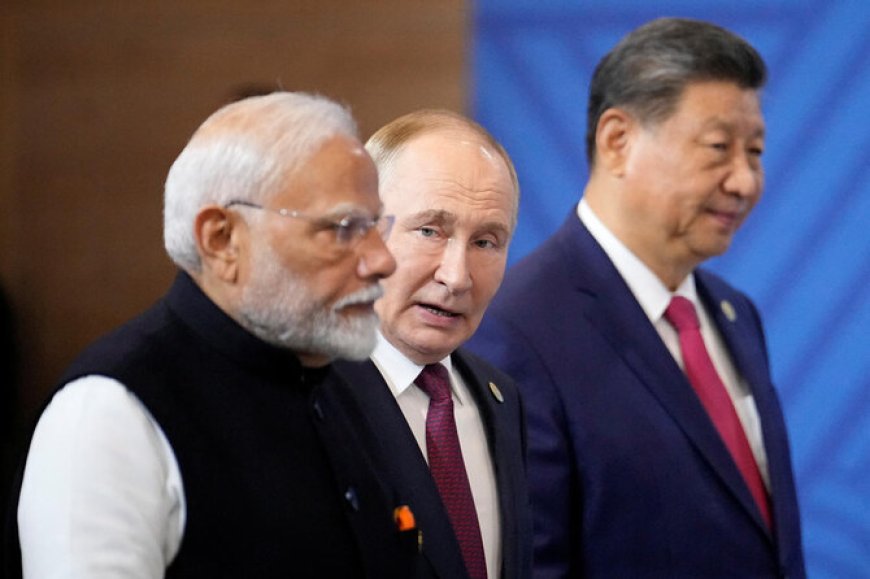Putin Champions ‘Multipolar World Order’ at BRICS Summit, Challenging Western Dominance

At the 2024 BRICS summit in Kazan, Russian President Vladimir Putin touted the rise of a "multipolar world order," underscoring the growing influence of nations outside the Western-led sphere. This gathering marks Russia’s largest diplomatic event since the Ukraine invasion, which saw Moscow subjected to unprecedented Western sanctions and isolation efforts. Yet, Putin’s appearance at the summit signals his belief that these attempts have failed.
The Kazan meeting brought together leaders from around 20 nations, including China, India, Turkey, and Iran, solidifying BRICS as an alternative to Western institutions like the G7. Putin's rhetoric, highlighting the irreversible process of a multipolar world order, finds resonance with his key allies, particularly Chinese President Xi Jinping. Xi, reinforcing China’s strategic partnership with Russia, emphasized the strength of their relationship in a "chaotic" global environment, framing it as a stabilizing force in world affairs.
The summit’s agenda revolves around crucial issues, including the creation of a BRICS-led international payment system—a significant move that could challenge Western financial hegemony. Discussions also covered pressing global conflicts, from the ongoing Ukraine war to escalating tensions in the Middle East. UN Secretary General Antonio Guterres, attending the summit despite Ukraine’s protests, is expected to address the Ukraine conflict in a meeting with Putin.
Putin’s comments aimed to show that BRICS, which began with Brazil, Russia, India, and China in 2009, has grown into a formidable force with new members like South Africa, Egypt, and Iran. His separate talks with Iranian President Masoud Pezeshkian and Venezuelan President Nicolas Maduro underline his vision of BRICS as a counterweight to Western influence, bolstered by deepening relations with authoritarian-leaning governments.
Yet, the BRICS alliance doesn’t simply function as an anti-Western bloc. For countries like India and Turkey, the summit presents an opportunity to assert their own diplomatic independence. Indian Prime Minister Narendra Modi, while maintaining strategic neutrality in the Ukraine conflict, called for a peaceful resolution during his talks with Putin. Modi’s tightrope walk exemplifies India's broader ambition to serve as a mediator without severing ties with either Russia or the West.
Turkey, represented by President Recep Tayyip Erdoğan, also maintains a careful balance. Despite being a NATO member, Erdoğan's attendance highlights Turkey’s growing involvement in non-Western geopolitical structures like BRICS, reflecting its desire for "strategic autonomy." His dual approach allows Turkey to maintain its NATO commitments while fostering economic and diplomatic ties with Russia and BRICS nations, positioning Ankara as a potential mediator in the Ukraine war.
The summit’s theme—strengthening ties among emerging economies—also signals a shared disillusionment with Western-led global governance. The BRICS countries collectively represent nearly half the world’s population and a third of global GDP, giving them substantial leverage on the international stage. Their alignment challenges the Western monopoly on global decision-making, particularly in areas like trade, finance, and regional security.
However, the Kazan summit also illustrates the complexities of a multipolar world order. Countries like India and Turkey, while willing to engage with BRICS, are careful not to alienate the West entirely. India, for instance, has provided humanitarian aid to Ukraine but avoided direct condemnation of Russia, reflecting its desire to maintain strong ties with both Moscow and Western powers. Similarly, Turkey’s involvement in BRICS doesn’t signal a departure from NATO but rather a calculated bid to expand its influence in both Western and non-Western spheres.
For Russia, the BRICS summit represents a critical platform to demonstrate that it is not diplomatically isolated, despite ongoing international condemnation over its actions in Ukraine. Putin's ability to host such a significant diplomatic event with the participation of major powers like China and India showcases his efforts to reframe Russia's role in the global order. As the Ukraine conflict drags on, Moscow is increasingly looking eastward for partnerships, strengthening ties with China, Iran, and North Korea, while advancing militarily in eastern Ukraine.
Yet, the presence of leaders from countries like India and Turkey, which maintain diplomatic ties with both the West and Russia, indicates that BRICS is not a monolithic bloc. Instead, it reflects a new, more fragmented world order, where countries pursue diverse, and often conflicting, geopolitical interests.













































